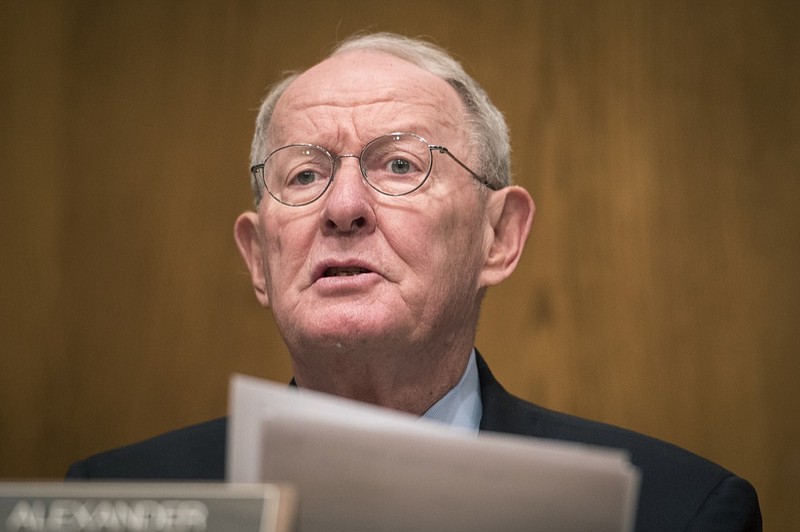Let's be frank. There are politicians in Washington, D.C., who seem to rack up pension credits and cruise into retirement, and there is Tennessee's U.S. Sen. Lamar Alexander.
The state's senior senator said months ago he wouldn't seek a fourth six-year term in 2020, so it would have been easy for him to serve out his days and go gently into that good night.
But not Alexander.
Just this month, he penned an opinion piece for the Washington Times on the need for a new Manhattan Project for clean energy, shepherded through the Senate Appropriations Committee a fifth consecutive year of record funding for the Office of Science, moved through the same committee the largest pay raise for military service members since 2010, supported Tennessee Gov. Bill Lee's proposal to give the state more flexibility in federal Medicaid dollars with block grants and voted in the Senate Appropriations Committee to approve $189.1 million for the construction of a new federal courthouse in Chattanooga.
And just Thursday, the Republican spoke in favor during a Senate confirmation hearing of the nomination of Eugene Scalia as U.S. Labor secretary. A photograph taken after the end of the hearing showed him still at work, talking to Sen. Patty Murray, D-Washington, the ranking member of the Health, Education, Labor and Pensions Committee, which he chairs, and trying to convince her of Scalia's merits.
On that same day, Alexander passed a milestone of sorts, becoming the longest serving Tennessean who was both a senator and governor.
In serving his 9,024th day in one or the other office, he passed Isham G. Harris, who was governor from 1857 to 1862 and senator from 1877 to his death in 1897.
Alexander was governor from 1979 to 1987 and has been a U.S. senator since 2003. He will have served 26 years in the two offices when he finishes his term. He is the only Tennessean elected statewide to both offices. Eight other men from the state served in both offices but were elected to the Senate by the state legislature before the 17th Amendment declared they would be elected by the people of the state.
Senate Majority Leader Mitch McConnell, R-Kentucky, marked Thursday's passage on the Senate floor and also spoke of the Volunteer State senator's work ethic.
"As impressive as these statistics are," he said, "his colleagues know that what makes Lamar Alexander tick is not political record setting. As we've often heard him say about the United States Senate, 'It's hard to get here. It's hard to stay here. And while you're here, you might as well try to accomplish something.' He surely has followed his own advice."
McConnell also reminded his fellow senators the Tennessee senator did something "that is not often done around here" - give up power (chairman of the Senate Republican Conference) for Senate committee leadership to, as he said, "spend more time working to achieve results on the issues I care about most."
Those issues often have found him working across the aisle with Murray and other senators, something done less and less in Washington.
In an interview with Compass, a Knoxville publication, in January, Alexander said that's the only way he knows how to do it.
"I learned to count in the Maryville city schools," he said. "If you need 60 votes in the Senate to get a result, that means you have to work with Democrats as well as Republicans."
Alexander also holds several other Tennessee political records.
He has won the most statewide votes of any candidate (1,579,477 in his 2008 re-election) and has won the most statewide Republican primaries (six).
Of the other Tennesseans elected both as governor and to the U.S. Senate, four had ties to Southeast Tennessee (Harris was born in Franklin County near Tullahoma; William G. Brownlow was supportive as a Jonesborough newspaper editor for improvements around the Moccasin Bend area of the Tennessee River for improved steamboat transportation; William B. Bate fought for the Confederacy in the Battles of Chickamauga and Missionary Ridge; and James B. Frazier practiced law in Chattanooga and ran for Congress from the 3rd District before being elected governor).
Another man elected to both positions was Andrew Johnson, 17th president of the United States and the only one to become a senator (his second time in that office) after leaving the presidency.
Alexander, meanwhile, wants to spend his last 15 months in office trying to accomplish the objectives he mentioned in the Compass interview earlier this year - reducing health care costs, making it simpler and easier for students to attend college and pay back their student loans, and pushing ahead with nuclear power and clean energy.
If he accomplishes those, they will only add to an already impressive - as well as history-making - legacy.
